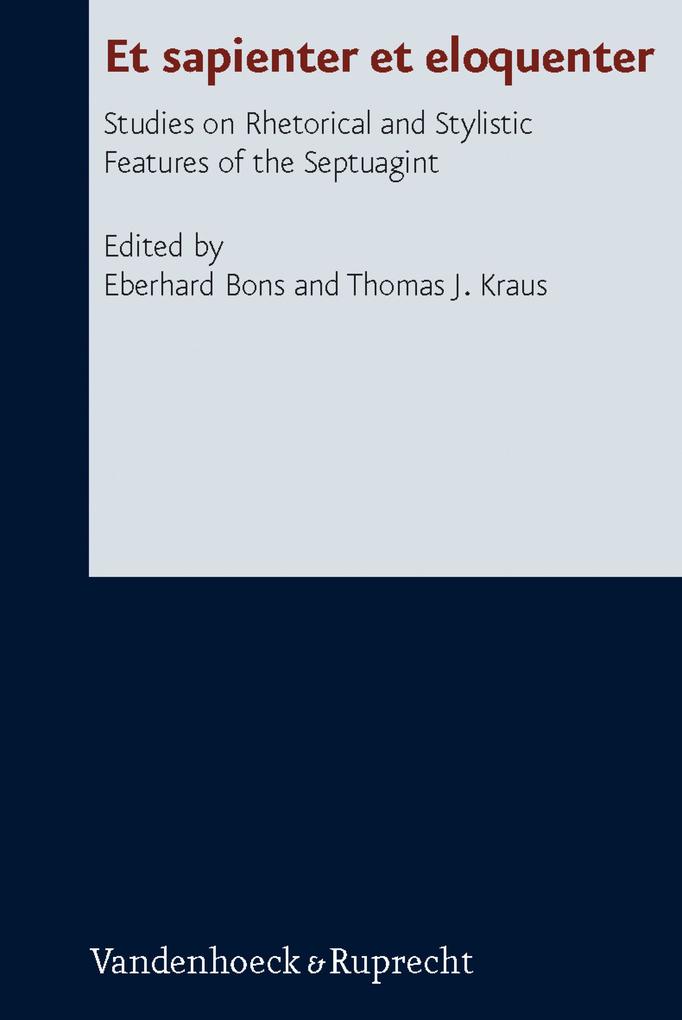Bücher versandkostenfrei*100 Tage RückgaberechtAbholung in der Wunschfiliale

Sofort lieferbar (Download)
As the ancient Greek version of the Old Testament the Septuagint is probably the first great translation project of Greco-Roman antiquity. Together with the Septuagint text the religion and culture of ancient Judaism came to the fore of a Greek speaking audience, which did not have any access to the holy scriptures of the Jews in Hebrew. That translation project also manifested a transfer of religious, social, and anthropological categories and concepts of Semitic origin to another cultural world of language and science that itself was shaped by Hellenism. Over the last years the Septuagint has gradually edged closer into the interest of Biblical scholars and into the centre of historical and philological research. In the course of this main attention has not only been paid to further particulars of its origination in Alexandria but also on various linguistic specifics and distinctive features with regards to content of the Greek Bible. The question, however, which has hardly been studied so far, is to what extent the Greek translation of the Bible consists of stylistic and rhetorical elements that are not present in the Hebrew source text. Did the translators made use of their rhetoric and stylistic skills to give their translations a distinctive ornatus? Can we, according to Augustine, rightly claim that not only the authors of the Biblical texts but also the translators knew to formulate et eloquenter et sapienter, i. e. in an eloquent and wise manner? This issue, neglected in current research, is taken up in this collected volume. Seven scholars investigate into stylistic and rhetorical elements present in various books of the Bible (e. g. , Psalms, Amos, and Solomon's Book of Wisdom) and establish a field of work that deserves to receive more attention in the future. Contributors are Eberhard Bons, Jennifer M. Dines, Katrin Hauspie, Jan Joosten, Thomas J. Kraus, A. Léonas, and K. Usener.
Inhaltsverzeichnis
1;Table of Contents;6 2;Preface ;8 3;Rhetorical ornamentation in the Septuagint: The case of grammatical variation ;12 4;Stylistic Invention and Rhetorical Purpose in the Book of the Twelve ;24 5;Translating the Septuagint Psalms some Lesefrüchte and their value for an analysis of the rhetoric (and style) of the Septuagint (Psalms) ;50 6;Rhetorical Devices in the Septuagint Psalter ;70 7;Griechisches im Griechisch der LXX;82 8;The Poetics of Wisdom: Language and style in the Wisdom of Solomon ;100 9;Periphrastic Tense Forms with eimi and gignomai in the Septuagint of Ezekiel ;128 10;Index of Ancient Sources;154 11;Index of Modern Authors;163 12;Index of Important Subjects ;164
Produktdetails
Erscheinungsdatum
20. Juli 2011
Sprache
englisch
Seitenanzahl
165
Dateigröße
1,50 MB
Reihe
Forschungen zur Religion und Literatur des Alten und Neuen Testaments
Autor/Autorin
Eberhard Bons
Herausgegeben von
Eberhard Bons, Thomas J. Kraus
Verlag/Hersteller
Kopierschutz
ohne Kopierschutz
Family Sharing
Ja
Produktart
EBOOK
Dateiformat
PDF
ISBN
9783647532615
Entdecken Sie mehr
Bewertungen
0 Bewertungen
Es wurden noch keine Bewertungen abgegeben. Schreiben Sie die erste Bewertung zu "Et sapienter et eloquenter" und helfen Sie damit anderen bei der Kaufentscheidung.









